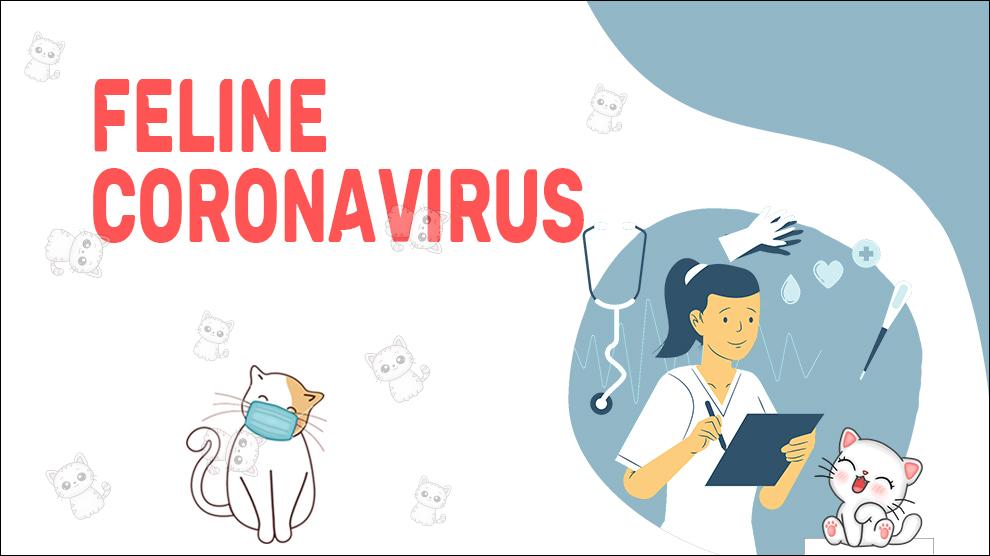What Is Feline Coronavirus?
Feline coronavirus (FCoV) is a common viral infection that affects cats.
It is a member of the family Coronaviridae and is closely related to the coronavirus that causes the COVID-19 disease in humans.
While FCoV is not typically a serious illness, it can cause a range of symptoms, and in rare cases, it can lead to a more severe condition known as feline infectious peritonitis (FIP).
Clinical Signs Of Feline Coronavirus
Most cats infected with FCoV show no signs or have only mild symptoms, such as diarrhea, fever, and lethargy.
However, in some cases, FCoV can progress to FIP, which is a more severe disease that affects the immune system and other organs.
Symptoms of FIP include:
- Fever
- Weight loss
- Fluid buildup in the abdomen
- Difficulty breathing
- Sneezing
- Tearing Eyes
- Nasal Discharge
- Distended Abdomen
- Diarrhea
- Lack Of Appetite
- Lethargy
- Vomiting
- Abdomen Swelling
- Eye Inflammation
- Dark Yellow Color Urine
- Yellow Eyes
- Yellow Skin
- Yellow Gums
- Depression
- Fatigue
- Weakness
FIP can also cause neurological symptoms, such as seizures and loss of coordination.
Treatment Options For Feline Coronavirus
Currently, there is no specific treatment or cure for feline coronavirus infection.
However, supportive care can be given to the affected cats to relieve their symptoms and improve their overall health.
This includes:
- Fluid Therapy: Dehydration is a common complication of feline coronavirus infection. So, the vet may recommend fluid therapy to maintain hydration and electrolyte balance.
- Nutritional Support: The vet may recommend a special diet or supplements to support the cat's immune system and overall health.
- Medications: Antiviral medications, immunosuppressants, and antibiotics may be given to manage secondary infections and reduce inflammation.
- Hospitalization: In severe cases, hospitalization may be required to monitor the cat's condition and provide intensive care.
Home Remedies For Feline Coronavirus
There are no home remedies for FCoV or FIP, and treatment should be managed by a veterinarian.
However, you can help manage your cat's symptoms by providing a comfortable and clean environment, encouraging your cat to drink plenty of water, and feeding your cat a bland diet.
How To Prevent Feline Coronavirus?
Preventing feline coronavirus infection can be challenging, as the virus is highly contagious and can spread easily.
However, there are a few measures that can be taken to reduce the risk of infection:
- Vaccination: Vaccination is available for feline coronavirus, but it is not recommended for all cats. The vaccine is usually given to cats that are at high risk of infection, such as those in a shelter or cattery. However, the vaccine does not provide complete protection against the virus.
- Good Hygiene: Regular cleaning and disinfection of litter boxes, food, and water bowls, and other areas that the cat uses can help prevent the spread of the virus.
- Limit Contact: Limiting the cat's contact with other cats, especially those with unknown vaccination status or cats with respiratory infections, can help reduce the risk of infection.
- Quarantine: If a cat is suspected of having a feline coronavirus infection, it should be quarantined to prevent the spread of the virus to other cats.
Affected Cat Breeds Of Feline Coronavirus
All breeds of cats can be affected by feline coronavirus infection.
However, cats that are kept in multi-cat environments, such as catteries, shelters, and breeding facilities, are at a higher risk of infection.
Causes For Feline Coronavirus
Causes:
FCoV is transmitted through contact with infected feces, urine, or saliva.
The virus can survive in the environment for several weeks, so cats can become infected by coming into contact with contaminated surfaces, such as litter boxes, food bowls, and bedding.
The virus can also be spread by direct contact with an infected cat.
When To See A Vet For Feline Coronavirus?
If you notice any of the symptoms of feline coronavirus infection in your cat, it is important to seek veterinary care immediately.
Early diagnosis and treatment can improve the cat's chances of recovery and reduce the risk of complications.
Additionally, if you have multiple cats, and one cat is diagnosed with feline coronavirus, you should seek veterinary advice on how to prevent the spread of the virus to other cats.
Food Suggestions For Feline Coronavirus
There are no specific food suggestions for cats with feline coronavirus infection.
However, it is important to ensure that the cat is eating a balanced and nutritious diet to support its immune system and overall health.
Conclusion
Feline coronavirus infection is a common viral disease that affects cats worldwide.
While most cats with feline coronavirus infection have mild or no symptoms, some cats can develop severe illness, including feline infectious peritonitis.
There is no specific treatment or cure for feline coronavirus infection, but supportive care can be given to relieve the symptoms and improve the cat's overall health.
Preventing the spread of the virus can be challenging, but measures such as vaccination, good hygiene, and limiting contact with other cats can help reduce the risk of infection.
If you suspect that your cat has a feline coronavirus infection, seek veterinary care immediately to ensure prompt diagnosis and treatment.











